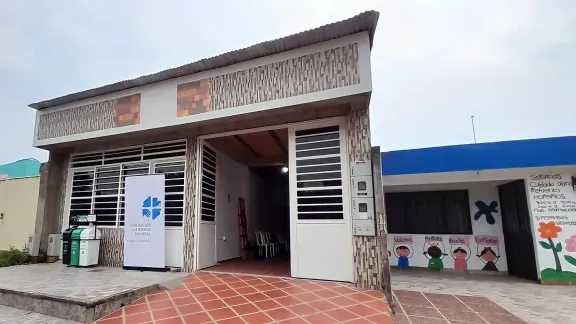A Venezuelan woman walks 1,212 kilometers to Bogotá and now returns four years later

LWF’s SAFER project humanitarian support point is a welcome sight for migrants in Arauca, Colombia. The transit point works to ensure a safe migration along the routes in Eastern Colombia. Photo: LWF/D. Alvarez
(LWI) - More than 6 million refugees and migrants have left Venezuela as a result of the political turmoil, socio-economic instability, and the ongoing humanitarian crisis according to the United Nations International Organization on Migration. The majority of those who have fled are women and children seeking safety and security elsewhere. Many of the refugees and migrants have journeyed to neighboring countries such as Colombia in search of a better life.
The Lutheran World Federation (LWF) World Service is providing humanitarian assistance to more than 168,000 people who have found refuge in Arauca and Casanare, at the Northern border of Colombia, through a consortium with partners. Funded by the European Union's humanitarian aid department.
“I can’t imagine what we would have done without these humanitarian support points.”
Denitze is a Venezuelan woman who has returned to her country after spending four years in Colombia's capital Bogotá. She made the difficult decision to return to Venezuela because of the cold weather and constant sickness her children were experiencing. Her husband, and their three children are from the state of Yaracuy in Venezuela. To get to Bogotá they had to walk 1,212 kilometers. On their return trip they walked for more than three weeks and still have more than 760 kilometers to go. For Denitze and her family, the humanitarian support point created by the consortium has been an immense help, offering a place to rest before they continue their journey.
"We have been walking for about three weeks now. When we arrived here in Tame, Arauca, a worker told us about this center that offers help for Venezuelans. I can’t imagine what we would have done without these humanitarian support points,” Denitze says.
LWF World Service has been working in Colombia since 2002, and currently has programs in Arauca, Casanare, Chocó, Córdoba, Meta, Antioquia, and Bogotá. The new consortium aids Venezuelan refugees and migrants along the migration routes in eastern Colombia. Services provided come in the form of basic needs support, psychosocial support, legal assistance, and protection services.
Supporting safe migration
LWF’s project supports safe migration along the migration routes in Eastern Colombia and caters to migrants like Denitze and their families along the Colombia and Venezuela border.
“Denitze’s journey is a reminder that there are many people displaced by the Venezuelan crisis who need assistance,” says Michael French, LWF regional program coordinator for Latin America and the Caribbean. “Our goal is to ensure that the rights to service and care of families and individuals migrating is respected as they make these long difficult journeys.”
Our goal is to ensure that the rights to service and care of families and individuals migrating is respected as they make these long difficult journeys.
– Michael French, LWF regional program coordinator for Latin America and the Caribbean
The LWF takes leadership in the activities along the Arauca and Casanare route, through a protection strategy that includes actions such as the opening of three humanitarian support points in the municipalities of Saravena, Arauca and Paz de Ariporo. The centers also offer training and awareness-raising workshops on gender-based violence and protection for health promoters and public officials, mine risk education, formation and training of women's support networks in human settlements, prevention of sexual exploitation and abuse and other essential protection and care trainings.
Additionally, LWF provides water, sanitation and hygiene services for 16 settlements, four each in Saravena, Tame, Paz de Ariporo and Yopal. In cases of more vulnerable groups, family hygiene kits, COVID-19 prevention kits and water filters are delivered, along with the formation and training of water committees.
By LWF/D. Alvarez and LWF/T. Rakoto


